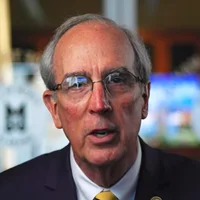The Alabama Medical Cannabis Commission (AMCC) approved proposed new rules regulating the introduction of medical marijuana in the state of Alabama.
“You and the staff have done a wonderful job,” said Commission Chairman Steven Stokes to Executive Director John McMillan.
“The four of them (the AMCC staff and legal counsel) have done an outstanding job working with the rules and regulations we have,” McMillan said.
“This document is not perfect,” said Assistant Director Daniel Autrey. “We have had significant involvement from all of the members, and we appreciate your involvement."
Autrey said the public comment period on the matter ended last Friday. The document will now go to the Legislative Service Agency and rules should be published by Aug. 31.
The rules could be adopted as early as Oct. 17.
Justin Aday is the AMCC Legal Counsel
“I have spent 16 years working with government, but I would just like to say after being here for three and a half weeks this has been the greatest challenge to date,” Aday said.
Will Webster is an attorney with the Montgomery-based Webster Henry Law Firm and outside counsel for the AMCC.
“This is something that can and will be changed as we deal with licensees, the public, and caregivers,” Webster said. “It hasn’t been easy to turn this around in the turnaround period we had, but we did it.
“What we have in this book is 171 pages of these rules."
Webster said that there are changes in this version of the rules and regulations from the version that the Commission started with based on public input.
“The definition of batch is something we had to work on,” Webster said. “We have now separated that into a harvest batch and a production batch.”
The Commission, at the urging of the industry, also greatly reduced the security at the marijuana facilities.
“We have tried to strike a balance between providing the security that we need and producing a product that is affordable for the people of Alabama,” Webster explained. “We reduced the number of security guards from two guards 24 hours a day, seven days a week, 365 days a year to one during business hours. Another thing that got eliminated is the idea of three-inch doors. I don’t know how that got in there; but they will be reinforced doors.
“We have eliminated the standalone requirements for dispensaries. Many of the times these businesses will be in downtown and urban settings.”
“We are set to meet the goal of having that live and available on our website Sep. 1,” said AMCC Communications chief Brittany Peters of the link to request application forms for prospective licensees.
Commissioner Judge Charles Price said, “Minorities particularly in rural areas have not been recruited into this. If you read the statute this is an area that concerned the legislature.”
“We are moving forward in the application phase,” Autrey said. “The application review will be done by the Commission or a third party or a combination. Some states have done a good job and some states have done a very bad job at that. We are looking at all of those options and are looking at the best option for our program and we will learn more about this in coming weeks.”
“We are in the process of hiring a full-time accountant,” said Director McMillan. He praised the work that the Commission has received from the accountant that was borrowed from another state agency part-time and said that she will continue to assist the commission.
Vice Chair of the Commission Rex Vaughn made the motion to adopt the rules and regulations as drafted. Price seconded the motion.
One Commissioner who joined the meeting via the internet said, “We have only been given 24 hours to review the rules and regulations. We should have more time to review the rules and regulations.”
Stokes said that there is no provision in the statute for the Commission to vote by email and that to hold another meeting would require giving thirty days notice, so delaying would slow the whole process down until the middle of September.
“We can still modify the rules and regulations if problems come up,” Stokes said. “There are a lot of people that want us to keep on schedule on this.”
The Commission voted to adopt the 171-page binder of rules and regulations. The one dissenting member voted to abstain.
Vaughn said, “Our fees start on the low side so we would not be a burden on the people of Alabama.”
The Commission voted to approve the proposed fees for licensees.
"The code of conduct and ethics is not designed to call into question any member of the Commission or any members of the staff,” Day explained introducing the proposed code of conduct and ethics for the Commission and its staff.
“We are bound by state law. The law is what binds each of us. The code is completely consistent with the law. There is not protection for members or staff if we violate the law. It shows the people that will be regulated by this commission that we are bound by the highest level of ethics for this Commission and the staff."
“Is there another state agency that has a written code of ethics?” Price asked.
“Are there any other agencies that have a separate code of conduct?” Day said. “I am not sure. I am sure that there are some. I think it is helpful. It gives us an extra layer of understanding and ethics. It is similar to requiring ethics training.”
“We have already signed a state ethics form, how is this different than what we have already signed?” Stokes said.
“This is the commission’s internal document acknowledging that we are aware of the law and will follow the law,” Day answered.
“I am not opposed to the document, but my word is my bond and I have already given that,” Price said.
The Code of Conduct and Ethics was approved by the Commission unanimously.
“I am concerned that we have large rural areas of the state where we don’t have a doctor. How do we get those people access to medical marijuana?” Stokes said.
“Telemedicine clearly works,” said Commissioner Dr. William Saliski. “Right now, as the law stands, it has to be face-to-face. We would have to go back to the legislature about this. We will work a little more on that. I will speak to my committee, and we will get back to you on that.”
Stokes said that the next AMCC meeting will be in September.
McMillan told 1819 News that they did change the rules and regulations to allow that marijuana can be grown in greenhouses as some in the industry had demanded.
“They could, as long as you met the security requirements,” McMillan said. “We decided to go with the definition that Ag and Industries have. In truth you really can’t grow this right in a regular greenhouse. You have to be able to control the temperate and the lighting.”
The AMCC-issued licenses to grow, process, transport, or dispense medical cannabis will be issued on July 10, 2023 at noon unless there is an appeal that is ongoing and if the Commission is able to maintain the proposed timeline. This is contingent upon the rules becoming effective on Oct. 17.
Alabamians who have a documented medical need will be able to get a recommendation for cannabis from their doctor and purchase Alabama medical cannabis no earlier than late 2023.
To connect with the author of this story, or to comment, email brandon.moseley@1819News.com.
Don’t miss out! Subscribe to our newsletter and get our top stories every weekday morning.










